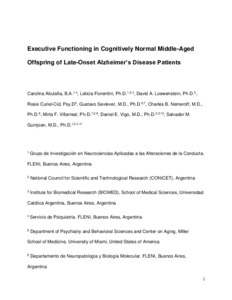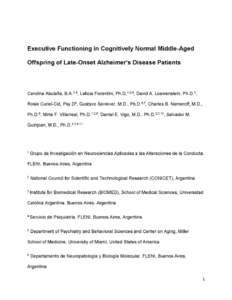Please use this identifier to cite or link to this item:
https://repositorio.uca.edu.ar/handle/123456789/9162| Título: | Executive functioning in cognitively normal middle-aged offspring of late-onset Alzheimer's disease patients | Autor: | Abulafia, Carolina Andrea Fiorentini, Leticia Loewenstein, David A. Curiel-Cid, Rosie Sevlever, Gustavo Nemeroff, Charles B. Villarreal, Mirta F. Vigo, Daniel Eduardo Guinjoan, Salvador M. |
Palabras clave: | MEMORIA; FUNCIONES EJECUTIVAS; ENFERMEDAD DE ALZHEIMER; SALUD MENTAL | Fecha de publicación: | 2019 | Editorial: | Elsevier | Cita: | Abulafia, C. et al. Executive functioning in cognitively normal middle-aged offspring of late-onset Alzheimer's disease patients [en línea]. Journal of Psychiatric Research. 2019, 112. doi:10.1016/j.jpsychires.2019.02.016 Disponible en: https://repositorio.uca.edu.ar/handle/123456789/9162 | Resumen: | Abstract: Episodic memory deficits are traditionally seen as the hallmark cognitive impairment during the prodromal continuum of late-onset Alzheimer's disease (LOAD). Previous studies identified early brain alterations in regions subserving executive functions in asymptomatic, middle-aged offspring of patients with LOAD (O-LOAD), suggesting that premature episodic memory deficits could be associated to executive dysfunction in this model. We hypothesized that O-LOAD would exhibit reduced executive performance evidenced by increased errors and decreased strategy use on an episodic memory task. We assessed 32 asymptomatic middle-aged O-LOAD and 28 age-equivalent control subjects (CS) with several tests that measure executive functions and the Rey Auditory Verbal Learning Test (RAVLT) to measure memory performance. All tests were scored using both traditional and process scores (quantification of errors and strategies underlying overall performance). T-tests were used to compare performance between both groups and Spearman correlations were implemented to measure associations between variables. O-LOAD participants exhibited decreased executive performance compared to CS as it relates to initiation time (Tower of London), mental switching (Trail Making Test B), and interference effects (Stroop Word-Color condition). Traditional RAVLT measures showed a poorer performance by O-LOAD and RAVLT process scores revealed increased interference effects on this group. Positive correlations (rs) were found between the executive measures and several RAVLT measures for O-LOAD but not for CS. In conclusion, O-LOAD participants exhibited early subtle cognitive changes in executive processing. Observed memory difficulties may be associated in part to executive deficits suggesting an interplay between memory and executive functions. Process score impairments were observed earlier than clinical decline on neuropsychological scores in this at-risk cohort and might be useful cognitive markers of preclinical LOAD. | URI: | https://repositorio.uca.edu.ar/handle/123456789/9162 | ISSN: | 0022-3956 (impreso) 1879-1379 (online) |
Disciplina: | MEDICINA | DOI: | 10.1016/j.jpsychires.2019.02.016 | Derechos: | Acceso abierto. 12 meses de embargo | Fuente: | Journal of Psychiatric Research. 2019, 112 |
| Appears in Collections: | Artículos |
Files in This Item:
| File | Description | Size | Format | |
|---|---|---|---|---|
| executive-functioning-cognitively-normal.pdf | 441,49 kB | Adobe PDF |  View/Open | |
| executive-functioning-cognitively-normal.jpg | 184,99 kB | JPEG |  View/Open |
Page view(s)
259
checked on Apr 30, 2024
Download(s)
475
checked on Apr 30, 2024
Google ScholarTM
Check
Altmetric
Altmetric
This item is licensed under a Creative Commons License

